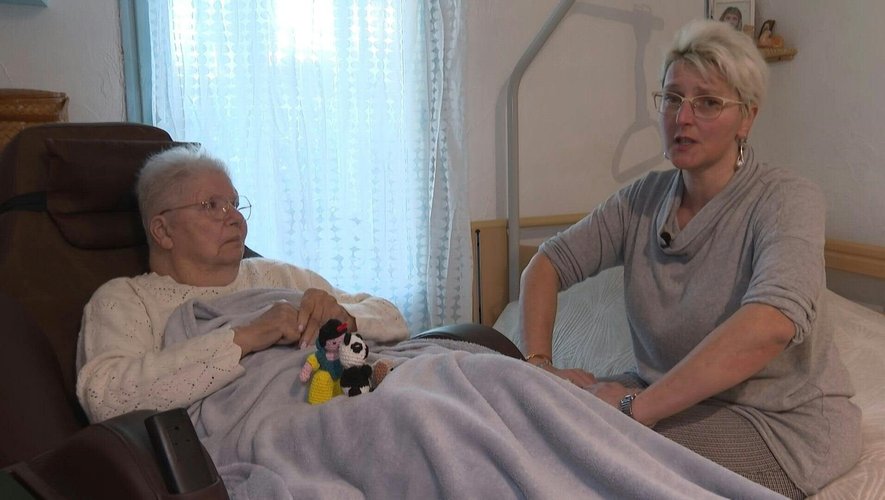(AFP) – “I have the impression that it’s an aunt who lives with us”: in Cavaillon, in the south of France, Audrey Jacquet and her family welcome Marguerite, 86, whose relatives live far away, an increasingly popular way of supporting the elderly.
Around the kitchen table, the nerve center of the home, it’s snack time for Mrs. Jacquet’s nine and 12-year-old children as well as for “Magguy”, as the family nicknames her, which also has three dogs and a cat, and with whom the old lady has lived for years.
“I was an insurance salesperson until 2016, but when I was little, I wanted to be a doctor or a nurse (…). After eleven years of career, I got fed up because I wanted a more human profession” , recalls Audrey, 45, who became a home helper before taking the nursing assistant competition.
“I wanted basic training”, she explains, even if to be a family carer for the elderly or disabled, no diploma is required, “you just need to have a successful reception project” and to obtain approval from the county council.
In France, around 4,750 seniors are housed in family homes, a drop of water compared to the approximately 600,000 residents in accommodation establishments for dependent elderly people (Ehpad).
“For people who no longer have a lot of family, this mode of support really corresponds to their needs: it’s a cocoon”, explains Myriam Mazzocut, head of service in the department of Vaucluse, which has twenty host families. of elderly or disabled people, i.e. some 60 places, a “fairly low” number compared to demand. In France, the number of people over 85 is climbing and will reach 4.8 million people in 2050.
Foster care allows “personalized support” offering a third way between placement in an institution and home care.
“We try to preserve normal life as much as possible”, testifies Nadia Chebil, 56, who has been welcoming people suffering from neurodegenerative diseases into her home since 2019, during the day, a pilot project.
After working fifteen years as a nursing assistant in a unit for Alzheimer’s patients, “I resigned from the public hospital service because I was on the verge of burnout. As I love my job, I I wanted to continue to exercise it but in a human way”, continues the sparkling fifty-year-old who takes care of three people that day in her house in Arles (Bouches-du-Rhône).
“When I worked in nursing homes, what I liked the most were going out, making them do activities”, adds the one who brings together, via her association called “La maison du droit au répit”, many speakers coming from lead art therapy, theater or sophrology workshops at home.
– “Less drugs” –
That day, a photographer full of empathy, Gilles Garnier, tries to make Mireille, 77, and André-Pierre, 83, suffering from Alzheimer’s disease, rediscover the gestures they performed in their professions. respective thanks to shots.
“That’s what does them the most good. When the days are busy, you’ve seen people and you’ve continued to live a normal life, you sleep better at night, you take less medication “, develops Nadia.
“I have always worked as a team and I wanted to keep this dynamic of sharing”, adds the one who feels growing suffering in the face of a “very very important turnover” of the people welcomed. Since the Covid, they come for shorter and shorter periods and are younger and younger.
Like Jean-Marie, 56, suffering from frontotemporal dementia.
“It’s a tornado,” she sums up, turning to a tall man with a lost gaze, once very athletic, who can’t stand still.
“You put a gentleman like that in an Ehpad, the caregivers can’t get out of it”, continues the welcoming family, who receives help from her two “assistants”, her dogs Plume and Saba, real “therapeutic tools” , especially during walks.
“The initial idea was to slow down the progression of the disease, to save families a few years before going to nursing home,” she continues.
“When people no longer have too much autonomy, when they are no longer too communicative, unfortunately, it is difficult to offer them things” in an institution. “Here, it happens spontaneously because she is with us, we will easily include her in what we do”, describes Audrey Jacquet, referring to the “benevolent” presence of Magguy.
“We keep warm”, continues the welcoming, to whom her home job allows to collect 2,000 euros net and also to be present with her children.
“I am the happiest caregiver in France because I have a lot of freedom, I see happy people and families who express their joy to me,” concludes Nadia Chebil.

